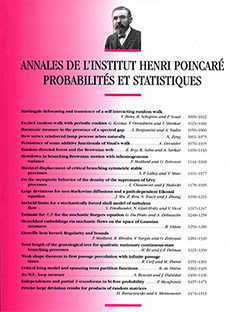Abstract
Let $p_{N}$ be a random degree $N$ polynomial in one complex variable whose zeros are chosen independently from a fixed probability measure $\mu$ on the Riemann sphere $S^{2}$. This article proves that if we condition $p_{N}$ to have a zero at some fixed point $\xi\in S^{2}$, then, with high probability, there will be a critical point $w_{\xi}$ at a distance $N^{-1}$ away from $\xi$. This $N^{-1}$ distance is much smaller than the $N^{-1/2}$ typical spacing between nearest neighbors for $N$ i.i.d. points on $S^{2}$. Moreover, with the same high probability, the argument of $w_{\xi}$ relative to $\xi$ is a deterministic function of $\mu$ plus fluctuations on the order of $N^{-1}$.
Soit $p_{N}$ un polynôme aléatoire de degré $N$ en une variable complexe tel que ses zéros sont distribués indépendamment suivant une mesure de probabilité $\mu$ fixée et définie sur la sphère de Riemann $S^{2}$. Cet article prouve que si nous conditionnons $p_{N}$ pour avoir un zéro en un point fixé $\xi\in S^{2}$, alors, avec grande probabilité, il y aura un point critique $w_{\xi}$ à une distance $N^{-1}$ de $\xi$. Cette distance $N^{-1}$ est beaucoup plus petite que l’espacement typique entre deux points voisins pour $N$ points i.i.d. sur $S^{2}$, qui lui est d’ordre $N^{-1/2}$. De plus, avec la méme grande probabilité, l’argument de $w_{\xi}$ relativement à $\xi$ est une fonction déterministe de $\mu$, plus des fluctuations d’ordre $N^{-1}$.
Citation
Boris Hanin. "Pairing of zeros and critical points for random polynomials." Ann. Inst. H. Poincaré Probab. Statist. 53 (3) 1498 - 1511, August 2017. https://doi.org/10.1214/16-AIHP767
Information





